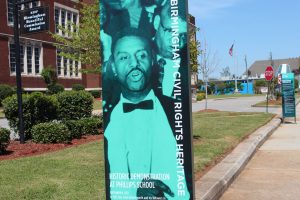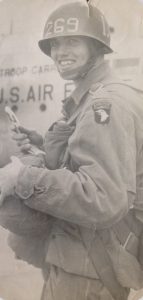April 16, 2016
“Injustice anywhere is a threat to justice everywhere. We are caught in an inescapable network of mutuality, tied in a single garment of destiny.”
Martin Luther King, Jr., “Letter from a Birmingham Jail”
I stood in front of Birmingham’s Phillips High School and cried. Here is where the civil rights movement hits home.

A historical marker describes how a gang of thugs beat Fred Shuttlesworth nearly to death for trying to register a group of teens, including his daughters, here on September 17, 1957. The men used baseball bats, brass knuckles, and chains. An oral history of one of those teens, Walter Wilson III, at Birmingham’s Civil Rights Institute, recounts how Shuttlesworth daughter, held back in the car, screamed for a fork – the only weapon she could conjure – to defend her dad. Later that night, despite his injuries, Shuttlesworth opened up a mass meeting. He wanted to show the racist world he lived in that violence would not deter justice.

A few days after Shuttlesworth’s beating, my uncle, Bobby Hughes – a Phillips High School graduate – shipped out from Kentucky’s Fort Campbell with the rest of the U.S. Army’s 101st Airborne Division. Their destination was Little Rock, Arkansas, and their mission: to protect nine black students enrolling in the city’s Central High School. The teens had endured taunts, name-calling, threats, and spitting from angry mobs of white adults who did not want them in the school. Arkansas’s Governor Orval Faubus deployed the state’s National Guard to keep them out. Finally, President Dwight D. Eisenhower sent the Army to escort them in, and protect them all year.
Uncle Bobby never talked much about his service to movement. “Just doin’ my job,” he’d say. But that “job” made me see, very early in my life, civil rights as more than a story in the past, in a book.
The civil rights movement was real people, like us, with their lives at stake, their bodies on the line,
What made me cry was not Shuttlesworth or Uncle Bobby, but the way we dishonor their work, turn back the clock, and sell out our kids through failing schools, mostly in poor and black neighborhoods.
The Tampa Bay Times recently did an exposé called Failure Factories that vividly lays out the problem.
When I say that the civil rights movement hit home, I refer to my son. His great-uncle Bobby Hughes stood up for educational justice, and now he lives in a Failure Factory system.
Here’s some up-close insight into how that system, known across the nation as the “school-to-prison” pipeline works.
Son attends a somewhat diverse, but mostly white magnet program in his zoned, mostly black public high school. A former foster kid with ADHD, he has issues that often make him late. Past a certain time, the school locks the doors, and he has to go in through the “Intervention Center.” As punishment for being tardy, students must sit with their feet flat on the floor and stare straight ahead for the rest of the period, no talking. I accept the tough love. Infractions need consequences. But, usually, instead of going to “IC” as it’s called, Son and other kids skip school. Informally, IC stands for “Incarceration Training.”
Son isn’t doing so well in the magnet program. Earlier this year, we attended a parent-teacher meeting to figure out ways of getting on track. One teacher asked if we want to give Son “a tour of prison.” He meant the rest of the school outside the magnet program. Son tells me that teachers regularly refer to the school’s “general population” as “inmates.”
I don’t know a lot about how social systems work, but I do know how people work. For the most part, kids shape themselves to fit adults’ expectations. It takes a lot of effort to get outside the box society puts you into. What are your choices when that box is a jail cell?
I’m confident that Son will be ok, despite his time in foster care and “incarceration training.” We are white, reasonably affluent college professors. We’re moving him to private school next year. I didn’t cry in front of Phillips High School for him, but for the kids in Failure Factories who don’t have the options we have.
Today, April 16, 2016, on the anniversary of “Letter from Birmingham Jail,” Martin Luther King’s words haunt me: “Injustice anywhere is a threat to justice everywhere. We are caught in an inescapable network of mutuality, tied in a single garment of destiny.” I don’t know how to fix a broken system. I don’t know how to put my body on the line like Fred Shuttlesworth or Uncle Bobby.
I feel like Shuttlesworth’s daughter crying out for a fork when thugs are all around me with brass knuckles and chains. My only weapons are stories.
Lives are on the line.